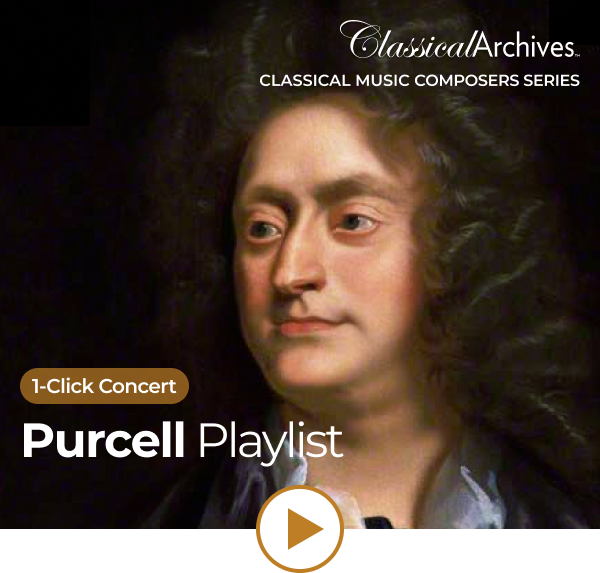|
Classical Music Composers: Henry Purcell (1659-1695) When you think of the greatest composers of the Baroque era, chances are you will name Bach, Handel, and Vivaldi. You would be right to cite those major composers. But today, we would like to suggest that the English composer Henry Purcell (1659-1695) should be included on your list. Purcell has more than just historical importance. His music is unique in every way, standing apart from other Baroque composers. His music has a unique sound. He was also a great melodist, and the way he set words to music was masterful. And then we come to the fact that a lot of his music is just simply beautiful. When you hear just about anything he wrote, it lingers in your mind. No doubt, he was a major composer. In this newsletter, let us explore the works of this eminent British composer. The Life of Henry Purcell Born in Westminster in 1659, Purcell displayed remarkable musical talent from a young age. His father, also named Henry Purcell, was a musician at Westminster Abbey, and it was under his guidance that the young Henry received his initial musical education. At the age of ten, he became a chorister at the Chapel Royal. Purcell's talent was soon recognized, and he received a thorough musical education. He studied under some of the leading musicians of his time, including John Blow (1649-1708), organist of Westminster Abbey, who became both a mentor and a lifelong friend. Purcell's prodigious talent was evident in his early compositions, which showed a remarkable maturity and originality. The lives of Henry Purcell and John Blow were intertwined. Blow preceded Purcell as the organist of Westminster Abbey. And then when Purcell died in 1695, Blow assumed that post again. And after Purcell died, Blow wrote a work for chorus and soloists, the Ode on the Death of Henry Purcell, which is absolutely remarkable. (It sounds like Purcell wrote it.) An excellent recording of this Ode is in the library of Classical Archives, and we have included it in the playlist that accompanies this newsletter. In 1677, Purcell was appointed as the organist of Westminster Abbey, a prestigious position that provided him with ample opportunities to write choral music and have it performed. Throughout his career, Purcell composed music for a wide variety of genres, including church music, instrumental music, keyboard works, and stage works. His compositions are characterized by their rich harmonies, expressive melodies, and masterful use of counterpoint. And again, they have that unmistakable “Purcell” sound. Purcell, a Master of Opera One of Purcell's most significant contributions to English music was his development of the English opera. His opera Dido and Aeneas, composed around 1688, is considered one of the masterpieces of the Baroque era. The opera tells the tragic story of the love between Dido, Queen of Carthage, and the Trojan hero Aeneas. Purcell's music perfectly captures the drama and emotion of the story, with its haunting melodies and powerful choruses. When you listen to it, it is amazing to think that he wrote it to be performed by the students at a girls’ school in London. The aria “When I am Laid in Earth,” sung by the heroine Dido as she is dying, is a masterpiece in its own right. It is hard to believe that it was first sung by a student. She must have been an exceptional talent. In addition to his operatic works, Purcell also composed a vast amount of church music. His anthems and sacred choral works are among the finest examples of English Baroque music. Compositions such as Te Deum and Jubilate in D major (1694) and O sing unto the Lord (1688) demonstrate Purcell's mastery of polyphony and his ability to create music of profound beauty and depth. Several of his choral works, including his several Odes for Saint Cecilia's Day, stand alongside the greatest choral works of the Baroque era. Purcell's instrumental music is equally impressive. His compositions for the keyboard and ensembles, such as the Suite in G major and the Chacony in G minor, showcase his skill as a composer and his innovative approach to form and structure. The Legend of Henry Purcell’s Death It is known that Purcell was a bit of a man about town. He liked to go to London pubs with a group of male friends – a practice that did not please his wife. According to legend, she locked him out of their house to punish him after he had been out carousing into the night. Forced to spend the night outdoors, he contracted pneumonia and died soon after. Apocryphal? Possibly. But despite his untimely death at the age of just 36, Purcell left behind a substantial body of work that continues to be admired and studied to this day. His music remains an integral part of the English musical heritage and continues to inspire musicians and audiences alike. Henry Purcell's Remarkable Compositions on Classical Archives Click on the title to listen. * Operas The Fairy Queen (semi-staged opera) Choral Works Welcome to All the Pleasures (ode for Saint Cecilia’s Day) Selected Anthems (Including “My Beloved Spake,” a blockbuster) Keyboard Works * If you are not yet a member of Classical Archives, we invite you to join now. Free 14-day trial memberships are now available. |
Start Your Classical Archives Subscription
If you do not wish to be contacted again about our developments, click <unsubscribe>




